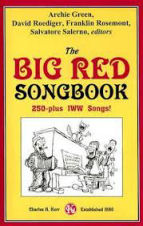Julie Herrada
Singing about Revolution & One Big Union

reviewed in this article
The Big Red Songbook, Archie Green, David Roediger, Franklin Rosemont, Salvatore Salerno, editors; 2007; 538 pp.; $24; Charles H. Kerr Co., 1740 West Greenleaf, Chicago, IL 60626. Available from The Barn (see page 55).
In a 100th anniversary commemorative edition of the Industrial Workers of the World’s Little Red Songbook, the editors have compiled over 250 IWW songs along with their histories and anecdotes about them. Covering songs that appeared in the notorious and ubiquitous volumes, from the 1909 to the 1973 edition, each entry includes lyrics and a brief description.
This mass compendium also includes stories by Wobbly songwriters, lost and found songs, and informative commentary. In addition, there is a discography, and indices of songs and of songwriters. A glossary of “labor language” prevalent in the songs is helpful for interpreting the slang.
“Lost songs” include those that never made it into the Little Red Songbooks. An interesting article by Rosemont brings up the question of who decided which songs were published, and how those decisions were made, since, despite the egalitarian mission, and the presence of women and African-American Wobblies, none of their songs ever made the cut.
Many of these raucous and entertaining songs “to fan the flames of discontent” have been recorded by musicians such as Joe Glazer, Billy Bragg, Utah Phillips, Pete Seeger, Anne Feeney, and others. The ones that haven’t can still be sung if you know the popular tune, since a good portion of them are variations on other songs with the same melody but altered lyrics. The editors have thoughtfully included the names of the originals, making it easy to turn to almost any page and be able to sing a rousing version.
This was demonstrated to me when a visiting South African friend saw my 1 copy of the book. Casually leafing through it, she stopped short at one song, “The Red Flag,” exclaiming that she had sung it in school as a child in Johannesburg in the 1970s. She sang it through for me to the tune of “Christmas Tree” (“Tannenbaum”).
The history of “The Red Flag” is documented in the book by its author, James Connell, an Irish revolutionary, who wrote it in 1889, but to the tune of “The White Cockade,” a traditional Scottish folk song. Connell, being a staunch atheist, strongly disapproved of the later version, writing in 1920 that it was “church music.” Billy Bragg recorded it with its original tune in 1990.
Another favorite oldie of mine is “Halleluliah, on the Bum,” (as the title is rendered here) by Harry McClintock, who recorded it in 1926 describing life on the road singing for his supper. This hobo tune was taught to me at a young age by my mother, and sung by her rail-riding hobo father before her.
However, I knew it as, “Hallelujah, I’m a Bum,” and all the references I could find to the song were titled this way. The book gives no information on how or when this change in title and chorus occurred. The lyrics are sung to the gospel hymn, “Revive Us Again,” and so many new verses have been added over the years that the song has taken on a life of its own.
The Big Red Songbook is a fitting tribute to the hundreds of songs and songwriters that gave fellow workers on picket lines, strikes, demonstrations, rallies, and in jail cells a sense of solidarity and the will to continue the struggle.
